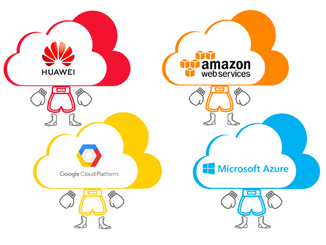Advertisement
Introduction
You may have heard about cloud computing, but what is it, exactly? Cloud computing is the ability to access information and applications over the Internet. This means that instead of having programs installed on your computer, you access them, or store them, on a remote server.
Advertisement
Advertisement
Cloud computing is made up of three main components:
1. The Client: This is the device you use to access the cloud. It can be a desktop computer, a laptop, a smartphone, or a tablet.
2. The Cloud: This is the remote server where your applications and data are stored.
3. The Network: This is the medium through which the client and the cloud communicate with each other—usually the Internet.
Defining Cloud Computing Platform
A cloud computing platform is a type of service that allows you to access technology and applications over the internet. It’s essentially a way to outsource your technology needs, making it possible for you to use software, storage and other resources without having to install them on your own computer.
There are a number of benefits to using a cloud computing platform. Perhaps the most obvious one is that it allows you to access your applications and data from anywhere in the world, as long as you have an internet connection. This makes it a great option for businesses that have employees or customers who travel frequently.
Additionally, a cloud computing platform can help you save money on hardware and software costs. You can also save time by not having to download and install new applications every time you want to try them out. And because the data is stored in the cloud, you don’t have to worry about backing it up or losing it if your computer crashes.
What Are the Advantages of Cloud Computing Platform?
There are several advantages of using a cloud computing platform. Perhaps the most important one is that you can access your data from any device, anywhere in the world. You don’t have to worry about installing software or hardware, or about backing up your data.
Another advantage is that you can scale your deployment up or down as needed, which makes it a perfect solution for businesses that are experiencing rapid growth or fluctuating demand. And you don’t have to pay for licenses, upgrades or maintenance fees.
What Industries Can Benefit From Cloud Computing Platform?
Cloud computing platforms have the potential to benefit a number of different industries.
For example, the technology can be used by retailers to manage their inventory and track customer behavior. This can help stores optimize stock and improve their offerings based on what is selling and what isn’t.
In addition, cloud computing platforms can be used by transportation companies to manage their fleets of vehicles. This would allow for better coordination between drivers and dispatchers, as well as easier tracking of shipments.
The possibilities are endless, and it’s only a matter of time until more businesses start to take advantage of cloud computing platforms.
Challenges With Implementing a Cloud Computing Platform
It’s undeniable that there are a few downsides and potential risks with implementing a cloud computing platform. One of the biggest challenges is the amount of trust you have to put into your cloud provider; you need to make sure that they can manage your data properly, protect it from security threats, and ensure reliable uptime and performance.
In addition, there’s also the risk of data breaches or malicious attacks. It’s important to be aware of these risks and take steps to prevent them, such as using encryption and investing in strong security protocols. Other challenges include the technical complexity of migrating existing systems, meeting compliance requirements, and having a reliable fallback plan in case of system failures.
As you can see, implementing a cloud computing platform isn’t exactly trivial and takes time and effort to do it right. However, if done correctly, the advantages far outweigh any potential risks or challenges.
Security of a Cloud Computing Platform
When it comes to security, cloud computing platform offers a much higher level of protection compared to hosting your own server. The cloud service provider offers their clients physical and cyber security measures such as managed firewalls, encryption technology and other proactive tools to safeguard the data stored in their system.
Furthermore, with a cloud platform you have the convenience of access control. This means that depending on the user’s credentials; admin can either grant or revoke permissions for certain applications or functionalities. Such feature ensures that only authorized personnel accessing your data or information.
Additionally, cloud platform providers are well aware of their responsibility to their customers and ensure that they maintain compliance with industry standards. And this makes them a more reliable option compared to self-hosting your own servers, which can be more vulnerable since it’s up to the organization itself to handle all security protocols.
Conclusion
In conclusion, by using a cloud computing platform, your business can save time and money while improving its efficiency and scalability. Make sure to research the different cloud computing platforms available to find the one that best meets your needs.


